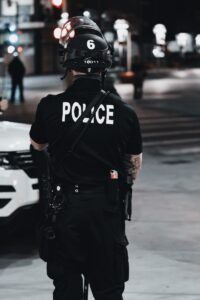 A significant gathering of activists took place at Atlanta’s City Hall in anticipation of a council vote regarding the allocation of tens of millions in public funding for the proposed construction of a police and firefighter training center. This facility, commonly referred to as “Cop City” by activists, has been the subject of intense criticism and opposition.
A significant gathering of activists took place at Atlanta’s City Hall in anticipation of a council vote regarding the allocation of tens of millions in public funding for the proposed construction of a police and firefighter training center. This facility, commonly referred to as “Cop City” by activists, has been the subject of intense criticism and opposition.
The meeting marked the culmination of nearly two years of activism against the project, which has attracted protesters from various parts of the country. The movement gained momentum, particularly following the tragic police shooting of Manuel Paez Terán, a 26-year-old environmental activist known as “Tortuguita.” Terán had been camping near the site of the proposed project in DeKalb County at the time of the incident.
During the meeting, which lasted over 13 hours, residents passionately expressed their opposition to the project, emphasizing that using substantial public funds to construct a massive facility in a large urban forest located in a predominantly Black, economically disadvantaged area would be a severe misappropriation of resources. The testimonies occasionally became heated, with council members struggling to maintain order in the boisterous crowd. Even at 3 a.m. on Tuesday, a dozen individuals remained in line, waiting for their turn to speak.
The gathering at City Hall showcased the strong and determined opposition to the construction of “Cop City,” with activists and community members voicing their concerns about the project’s financial implications and its potential impact on the surrounding community.
What is Cop City?
Cop City refers to a proposed police training facility in Atlanta, Georgia. The development plans for Cop City involve clearing and destroying a significant portion of the Weelaunee Forest to create a large-scale training facility for the police, intended to be the largest of its kind in the United States.
The construction and expansion of Cop City have raised concerns and garnered attention due to various intersecting issues. Critics argue that the project embodies the harmful influences of white supremacy, militarism, and the climate crisis. The facility’s development is seen as an expansion of police power at the expense of Black and Brown communities and other communities of color in Atlanta.
Supporters of the Cop City project include corporations and the Atlanta Police Foundation has received millions of dollars in funding from these entities. However, activists and organizations are actively working to stop the project. They call on the private investors to withdraw their support and sever ties with the Atlanta Police Foundation, emphasizing that Cop City will contribute to the escalation of state-sanctioned violence.
The neighborhoods surrounding the Weelaunee Forest, primarily consisting of lower-income Black residents, would directly bear the impact of the training facility’s presence. The facility’s existence raises concerns about increased police presence, potential violence against marginalized communities, and the disruption of their daily lives.
Additionally, Cop City’s construction would result in significant environmental damage. The destruction of the Weelaunee Forest would eliminate vital green space, disrupt local ecology, and pose risks to Atlanta’s climate resilience.
Opponents of Cop City emphasize the irreparable harm it could cause to Atlanta and its citizens. They aim to send a clear message to project investors that a massive police training complex is not welcome in the city.
Efforts to stop Cop City include petition campaigns and advocacy for divestment from corporations supporting the project. Activists are working to raise awareness about the intersecting issues of racial injustice, militarization, and environmental impact tied to Cop City’s development.




